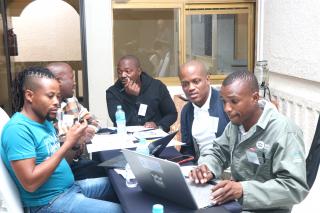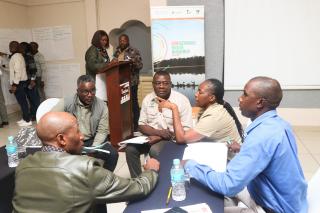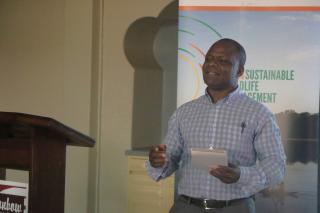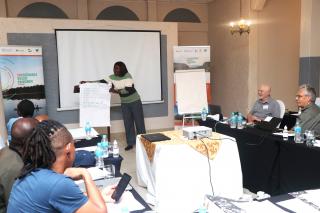- Home
- Worldwide
- Our regional offices
- Southern Africa and Madagascar
- News : Southern Africa and Madagascar
- Southern Africa | Reducing human-wildlife conflict and strengthening coexistence
Reducing human-wildlife conflict and strengthening coexistence in Southern Africa

The participants during the second Training of Trainers workshop © M. Katsi, Cirad
Human-wildlife conflict and coexistence (HWCC) is an increasingly critical issue for conservation and rural communities. As human populations encroach into wild areas, conflicts arise, making effective management strategies essential for the safety of both people and wildlife.
The Sustainable Wildlife Management (SWM) Programme, which is funded by the European Union, with co-funding from the French Facility for Global Environment and the French Development Agency, has been making significant strides in addressing HWCC through its innovative training of trainer workshops. These workshops exemplify the SWM Programme’s commitment to fostering coexistence between humans and wildlife, particularly in the Kavango–Zambezi Transfrontier Conservation Area (KAZA TFCA), where such conflicts impact both conservation efforts and community livelihoods.
The KAZA TFCA is a vast and ecologically significant region in Southern Africa, spanning parts of Angola, Botswana, Namibia, Zambia, and Zimbabwe. This region is home to diverse wildlife species, including elephants, lions, leopards, and many others. However, the expansion of human settlements, agricultural activities, and infrastructure development within the KAZA TFCA has fragmented wildlife habitats, further exacerbating human-wildlife conflict.
To address these issues, the SWM Programme hosted a five-day HWCC training workshop in Victoria Falls, Zimbabwe, following up on a 2023 workshop held in Maun, Botswana. These training workshops demonstrate how the SWM Programme is actively engaging with local communities and stakeholders across Southern Africa.
Bringing together 20 participants from Botswana, Namibia, South Africa, Zambia and Zimbabwe, the workshop provided a collaborative platform for sharing knowledge and experiences after implementing plans from the initial 2023 training.
Key Insights from the Workshop
Professor Christo Fabricius , one of the facilitators, highlighted the importance of community empowerment to improve livelihoods:
We are here to train people on how to become trainers and promote human–wildlife co-existence and how to use different tools, methods and frameworks to mitigate human wildlife conflict
Maxwell Phiri emphasized the value of :
cross-border knowledge exchange, which is crucial in regions like the KAZA TFCA where the movement of wildlife does not conform to human-imposed boundaries.
Participants shared their experiences implementing plans developed after the first training workshop :
The training was very helpful, it equipped us with tools to use to conduct effective community trainings, helping communities identify causes and solutions to conflicts.
Josias Mwinde had learnt to put communities first,
This approach empowers local communities, making them an integral part of the solution rather than passive recipients of externally imposed strategies.
The training has been very helpful in my work. I managed to conduct education awareness trainings on HWCC in two conservancies in Namibia. In addition, the HWCC action plan is also being implemented in six conservancies according to their work plan.
The training is very relevant in my work. Through the trainings I conducted, communities now understand and appreciate the coexistence approach and are capable of identifying the wildlife corridors and HWCC hotspots.
Conclusion
One of the key takeaways from these training sessions is the acknowledgment that HWCC situations are complex, multi-layered, and dynamic. Each case is unique, with underlying causes that are often difficult to discern and address. This complexity underscores the need for a multi-pronged approach to HWCC management, drawing from various theories, methods, and expertise.
Addressing human-wildlife conflict in the KAZA TFCA is urgently needed as it causes significant economic, social, and environmental impacts for communities and wildlife populations. Addressing these conflicts requires a multifaceted approach, involving wildlife management, community engagement, and sustainable development to balance the needs of people and wildlife in this ecologically important transboundary region.
Sustainable Wildlife Management (SWM) Programme The SWM Programme is a major international initiative funded by the European Union, with co-funding from the French Facility for Global Environment (FFEM) and the French Development Agency (AFD). Projects are being piloted and tested with governments and communities in 16 participating countries. The initiative is coordinated by the Food and Agriculture Organization of the United Nations (FAO), the Center for International Forestry Research and World Agroforestry (CIFOR-ICRAF), the French Agricultural Research Centre for International Development (CIRAD) and the Wildlife Conservation Society (WCS). For more information please visit: https://www.swm-programme.info/ |




























